Updated: March 13, 2024
Known for their mischievous hijinks and fondness for human interaction, it’s not hard to see why ferrets are common companion animals around the world. While many people are tempted to run out and adopt a ferret based solely on their quirky charm and impish good looks, it is important to know there is more to these amazing animals than initially meets the eye. Keep reading to learn all about these spunky little friends.
Ferret Basics: What is a Ferret?
Despite a somewhat popular belief, ferrets are not rodents. Ferrets are domesticated members of the mustelid family and share an ancestral link to species such as weasels, otters, badgers, martens, minks, and wolverines. Like other mustelids, ferrets are staunch carnivores and have an elongated body, short limbs, and rounded ears. Unlike their mustelid kin, however, ferrets are much less territorial and are often comfortable living in social groups.

Ferret Domestication
The domesticated ferrets we think of today are most likely descendants of the European Polecat and were native to the grassy plains of Western Europe and North Africa. They first gained popularity as a domesticated species more than 2000 years ago when they were used to hunt pests in the field and aboard ships. By the Renaissance Era, ferrets had proven themselves to be such proficient yet playful allies, that wealthy individuals (including Queen Elizabeth the First) often kept them as house pets.
In the mid-1860s, a significant number of ferrets were imported to the United States as an efficient and inexpensive way to protect crops and grain stores from rodents and other troublesome small animals throughout the West. By the early 1900s, however, most farmers and homesteaders began to favor the use of pesticides, rendering a great number of ferrets’ impressive hunting skills of no use. Luckily, their playful antics and appreciation for human attention made for a successful transition from field to family.
By the 1980s and 90s, ferrets had weaseled their way into the hearts and homes of thousands, solidifying them as one of the most common companion animals in the United States to this day.
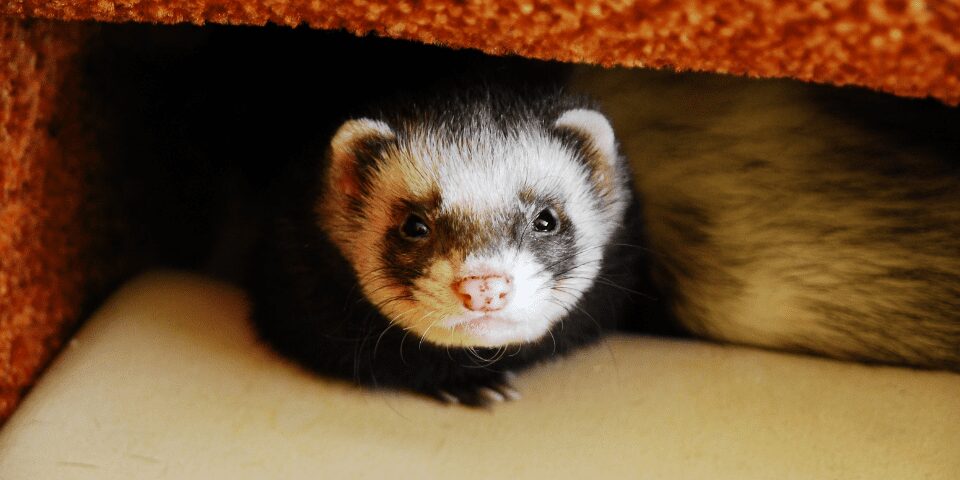
Male Ferrets vs Female Ferrets: Is There a Difference?
Though similar in many ways, there are a few differences worth considering between male and female ferrets. It is important to remember, however, that every ferret is an individual and your little ones may not fit exactly within these parameters. In general, however, both sexes tend to be equally friendly, inquisitive, intelligent, mischievous, and (of course) adorable.
| Males | Females | |
|---|---|---|
| Terminology | Hob (intact); Gib (neutered) | Jill (intact); Sprite (spayed) |
| Adult Weight (avg) | Slightly larger: 3 – 5 pounds | Slightly larger: 3 – 5 pounds Slightly smaller: 1.8 – 3 pounds |
| Adult Length (avg) | Slightly longer: 16 – 24 inches | Slightly shorter: 12 – 16 inches |
| “Typical” Personality | A bit lazier and more likely to hang around for extended snuggle sessions | Tend to be more independent and may be less cuddly, though they still love human interaction |
Ferret Ownership: Preparing Yourself and Your Home
Ferrets are among the most unique and enjoyable pets that you can welcome into your home and your family. In comparison to other small animals, ferrets are uniquely active, curious, and energetic. As predators in nature, ferrets possess unique instincts to hunt, explore, stash, and more. With this in mind, there are important considerations to make and steps to take to best prepare yourself and your home for welcoming a ferret into the family.
Ferret Proofing Your Home
Before you ever bring any pet home, there are some very important steps to take to make sure to prepare your home. This is especially important with ferrets, due to their unique shape, size, instincts, and ability to maneuver in and through areas of your home and furnishings. If this sounds daunting, don’t worry – we’ve created an expert guide that provides step-by-step instructions for ferret proofing your home!
Ferret Habitat and Enclosure
Because ferrets sleep most of the day and night, they tend to do quite well in a species-appropriate enclosure while their pet parents are at work or in bed. It is important to make sure the habitat you choose meets the following minimum requirements:
- As large as possible with multiple levels
- Narrow bars to allow for plenty of ventilation while lessening the risk of escape or entrapment
- Plenty of tunnels and bedding to burrow through
- Multiple hides, hammocks, and fleece pockets
- Multiple water sources (heavy no-tip crocks are strongly encouraged)
Bedding
Multiple layers of soft, washable bedding work well to wick away moisture while also providing an enriching way for your ferret to tunnel, dig, and hide.
Litter and Litter Box
Ferrets like to back into corners to go to the bathroom. Providing a large, corner litterbox in your ferret’s favorite potty corner is a great way to initiate the litterbox training process. It is always best to use a highly absorbent, all-natural litter to limit the risk of digestive concerns if consumed.
Ferret Health
All parents desire to provide the happiest, healthiest life for their pets. No two species are the same when it comes to health considerations and ferrets are no exception. Before committing to provide a forever home for a ferret, it’s important to understand factors including lifespan, common health issues, veterinary care requirements, and nutrition.
How Long Do Ferrets Live?
Just like all living things, human and animal alike, an average lifespan is never a guarantee. There are many factors that play into just how long an animal will live, including (but not limited to):
- Diet
- Husbandry
- Lineage
- Access to routine vet care
- Overall systemic health, etc.
In general, though, ferrets tend to live 5 – 10 years, with an average of 7 years being the norm. As with other exotic species, focus on proper nutrition and husbandry have shown to improve overall quality of life and gives your furry friend the best chance of living the longest, healthiest life possible.
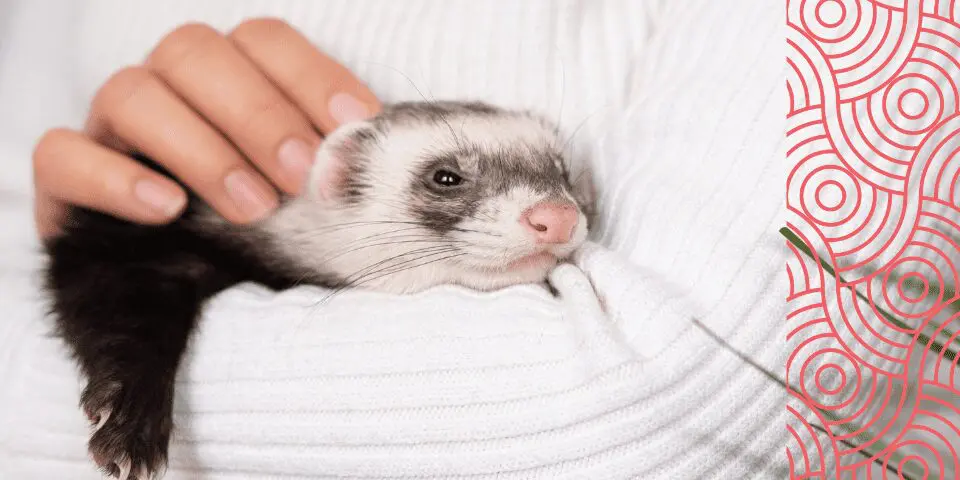
Common Health Issues in Ferrets
Ferrets are energetic and ultra-active, which makes it sometimes easy to overlook the fact that they can be prone to serious health issues. As with any animal, outcomes for ferret health issues are best when identified and treated early, so be proactive in monitoring your ferret’s health and maintain a regular schedule of wellness checks with your ferret’s veterinarian.
Internal health conditions in ferrets can include adrenal gland disease, insulinoma, lymphoma, and dilated cadiomyopathy.
External health conditions in ferrets can include gastrointestinal obstruction, dental disease, and traumatic injuries.
Finding the Right Ferret Vet
Though not a happy topic of conversation, it is important to note that domesticated ferrets do run a higher risk of developing certain health conditions. As a result, it is incredibly important to ensure you have a trusted ferret-savvy veterinarian that you visit for routine wellness exams and preventative care.
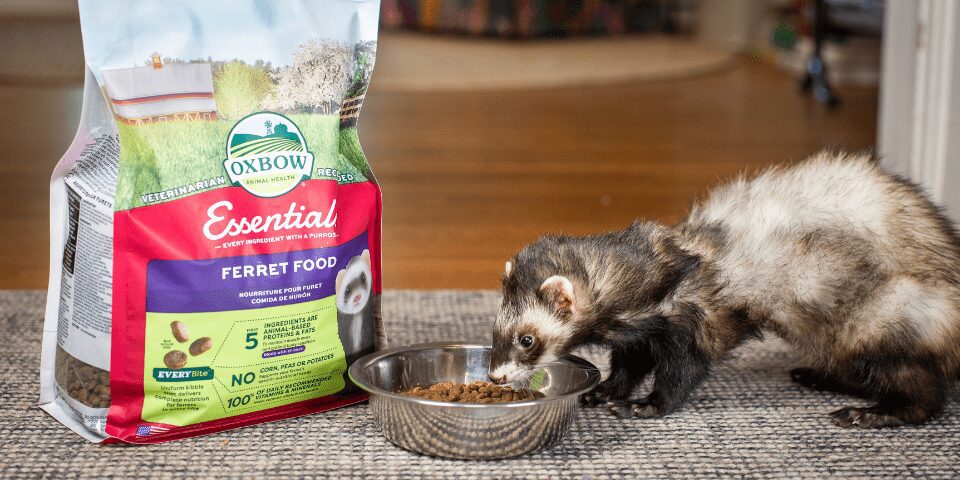
Ferret Food & Nutrition
As obligate carnivores, ferrets are unable to properly digest fruits, vegetables, and grains. As a result, they require a specialized high-protein, high-fat diet composed predominately of animal-based ingredients. To learn more about ferrets’ unique nutritional requirements read our ferret nutritional article.
Types of Ferret Food
Ferrets are carnivores that primarily eat a variety of small prey in the wild. When looking at commercial food options for your ferret, you will notice that most exist in a kibble form. Other forms of ferret food include raw and freeze-dried diets.
Not all ferret foods are created equal, with some falling short of modeling the natural diet. A high-quality ferret food should contain mostly animal-based ingredients that deliver high protein (>40%), high fat (at least 20%), and low fiber and carbohydrates (<5%).
No matter which type of ferret food you choose, it’s important to offer supplemental sources of protein. Depending on what works with your budget and home setting, good options can include chicken, cooked eggs, raw meat, whole prey, and dehydrated organ meats.
What Can’t Ferrets Eat?
As obligate carnivores, ferrets are unable to properly digest several foods that are likely staples in your kitchen.
Foods that are not appropriate for ferrets include:
- Fruits
- Vegetables
- Cereals
- Grains
Ferret Feeding Schedule
Thanks to their quick metabolism and short digestive tract, ferrets will typically need to eat every 3 to 4 hours. To account for this, it is recommended to have food available at all times. Most ferrets are good at self-regulating food intake and will only eat enough to meet their needs. Make sure that fresh, clean water is available at all times to keep your ferret hydrated.
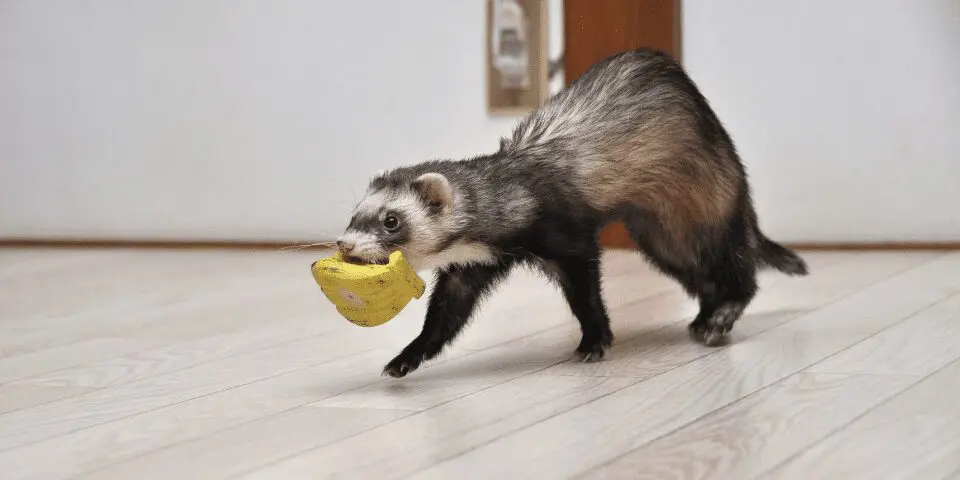
Ferret Behavior
Ferrets are incredibly social animals and crave interactive attention from their human family members. Though ferrets have a reputation for being sleepy weasels, spending much of their days and nights slumbering, these crepuscular cuties are incredibly active in the morning and evening. A benefit of ferret’s natural circadian rhythm is the fact they’re generally awake and active during the same hours their humans are home.
Ferret Socialization
As with all species of pets, socialization of ferrets is easiest and most effective when they are young. If your ferret is grown, however, the good news is that ferrets of all ages can be socialized. Proper socialization requires a commitment of time, energy, and patience, but the results are well worth it. Socialized ferrets are less likely to be destructive or aggressive and will be more enjoyable members of your family unit.
Can Ferrets Live Alone?
Ferrets are very social animals by nature. Ferrets can live alone but will require more time and attention from their humans in this scenario to keep them entertained, mentally engaged, and not destructive. Generally speaking, ferrets will be happier in pairs or groups. Before making the commitment to add a second ferret to your home and introducing ferrets to each other, there are important steps to take to ensure a healthy, happy introduction for all parties.
Ferret Training
It should come as no surprise that ferrets can be successfully trained to engage in numerous fun and healthy activities. After all, ferrets are incredibly intelligent and curious – two crucial factors for successful training. Among many activities, ferrets can be trained not to bite, to come when called, to use a litterbox, to roll over, to stand up, and more!
Ferret Enrichment
Every ferret-friendly enclosure and secure play area should provide multiple sources of enrichment. While the hides and hammocks mentioned above are certainly enriching, providing access to various toys and activity centers will ensure your ferret’s instinctive inquisitorial behavior needs are properly met.
Providing daily access to an enriching and carefully ferret-proofed environment will provide your slinky friend with a healthy outlet to simultaneously exercise their minds as well as their physiques. It is also important to ensure proper adult supervision any time ferrets are out and about to ensure their inherently meddlesome antics don’t result in an accident or injury.
Do Ferrets Bite?
Despite their close ancestral links to notoriously aggressive species like badgers and wolverines, the domesticated ferret species with whom we share our homes are not known to be biters. That said, young ferrets can be quite “mouthy” during play (like puppies and kittens) and may carry this playful chewing and biting into adulthood. As is true of any animal with teeth, ferrets may lash out and bite aggressively when startled, provoked, poorly socialized, or in pain. If a previously docile ferret suddenly shows aggressive behavior, it is always best to seek the counsel of a skilled exotics veterinarian.
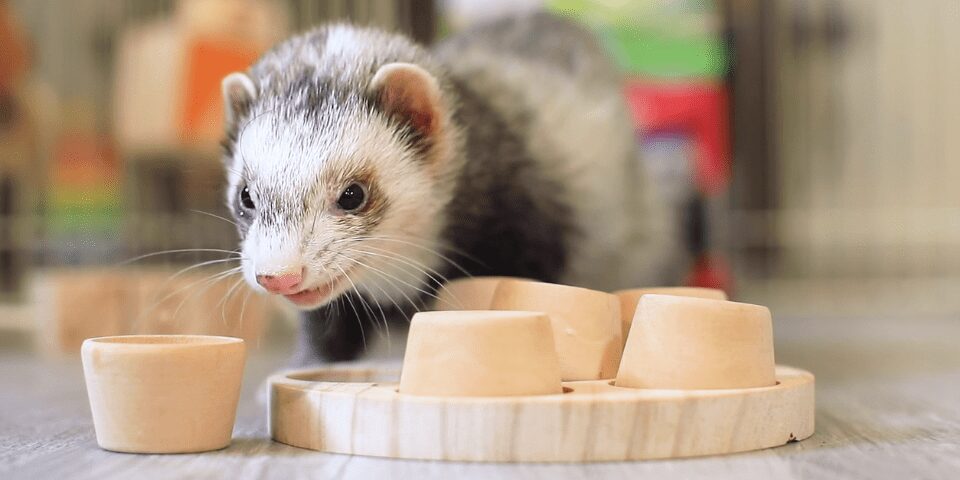
Ready to Own Your First Ferret?
Now that you’ve learned more about our fabulous ferret friends, are you excited about the prospect of welcoming one of these wonderful weasels into your home? We can’t blame you! Before you take the leap into your forever ferret friendship, however, we encourage you to learn a little more about factors to consider before adopting a ferret. Knowledge is power and we’re here to help you every step of the way!
